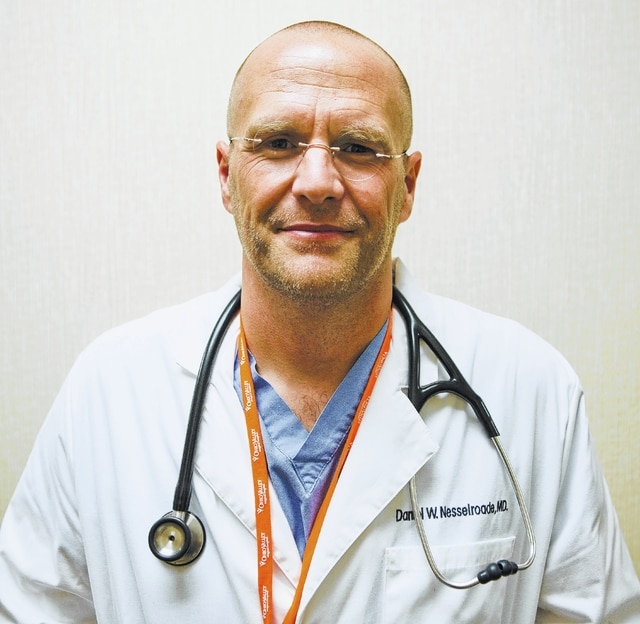
Dr. Daniel Nesselroade, who recently opened an OB/GYN office in Urbana, is excited about the opportunity to serve the health needs of women in Champaign County. This new chapter in his career follows nearly a decade that he and his family spent in Mali, West Africa, for a challenging and rewarding medical mission work.
The Nesselroades returned to Ohio last summer, so he’s had time to reflect on what the journey meant to him.
“I was so excited to go. It seemed like a great challenge. We felt clearly that medical mission work was what God was asking us to do,” he said. “Looking back now, I see that it was an enormous privilege. We were sent to Mali because that is where the need was. The ultimate vision was to try and build and open a hospital for the care of women and children, as both maternal and infant mortality were among the worst in the world.
The journey began in August 2003, when Dr. Nesselroade spent a year in France and learned to speak French before moving. He and his wife Marcy and their three daughters, (ages 8, 6 and 3 at the time,) arrived in Mali in March of 2005. He began studying Bambara, the dominant trade language spoken.
He didn’t need to speak the language to understand the country’s dire medical conditions. In 2005, the year before the Malian hospital was build and opened, the charity organization Save The Children had ranked Mali as dead last in their annual ‘Mother Index’ and named it as the worst place in the world to be a mother, quoting a collective maternal mortality of 10 percent. This is to say that 10 percent of Malian women were dying as a complication of childbirth. 1 in 10!
To find numbers similar to that in American history, Dr. Nesselroade said one has to go back to the mid 1800s – the Civil war era.
He was sent to work with a Malian charity called CPAM (a French acronym for the Protestant Center for Medical Assistance). CPAM was already directing six village clinics in remote locales in Southeastern Mali, but was desiring to establish a hospital where women could be referred for childbirth complications and at least be able to receive a safe Cesarean section. As a first task, there was a stark realization that a hospital would need to be constructed to help with the critical care of these women and children. And so a plan was put in place and funds were raised to build a hospital for Mali. The Koutiala Hospital for Women and Children opened its doors in May of 2006.
“The best way to imagine it was as a mini-obstetrical hospital built of concrete blocks with a corrugated tin roof that was not much bigger than an average suburban Ohio home,” he said. “There was a delivery room with two beds, an operating room, three office rooms to see outpatients and a postpartum ward with 15 beds. It was furnished and outfitted with donated equipment from the West.”
From the beginning, the hospital was stretched to capacity and subsequent buildings were added rapidly over the first five years. Now there are more than 2,500 births a year, nearly 1,500 surgical cases annually — many emergent — as well as a pediatric building with inpatient, outpatient and surgical services for children.
“We had the incredible privilege of watching God do it all,” said Dr. Nesselroade. “He brought people, doctors and nurses from Europe and America, and donated equipment from all over. Much of the main women’s building was built and furnished with the guts of the old Community and Mercy hospital buildings.
“We partnered with local Malian doctors and nurses and bring basic healthcare to a corner of the world with staggering need. Initially, we had hoped that God would allow us to pull off 1950’s obstetrics, that’s to say- c-sections, antibiotics and whole blood transfusion. In the end, God gave us 1980’s or even 90’s obstetrics, with ultrasounds, fetal monitoring and the whole 9 yards. I am still amazed by his kindness to us,” he said.
His family returned home in June 2014. “I feel like I left three quarters of my heart there in Africa. But I know as well, that it was our time to return. A young Malian doctor that was a recent medical school graduate working with us when the hospital opened is now a certified general surgeon and serves as the medical director.”
Dr. Nesselroade began to see that his time at Mali was drawing to a close and some family medical issues made it clear it was time for them to return to America. Their transition back to America was not without initial anxiety and fears, but he marvels at how well his daughters have done. Two are now in college and the youngest is in high school.
“One thing I see clearly now is that Africa, as egregious as the needs may be, has no monopoly on human suffering,” he said. “Life here is not really so different in this regard: if we have eyes to see it, we all encounter broken and hurting people every day. We are literally surrounded by them. We may even find them in the mirror.”
“The time in Africa has marked us all,” he said. “We learned much about the world, and even more about ourselves, but far and away the most valuable lessons learned were things about God and his character. People matter because first and foremost, they are precious to God. When we seek to serve others and meet their needs, not only do we find the resources of heaven itself at our disposal, but we find ourselves enlarged and changed by the process. And we become more human.”


